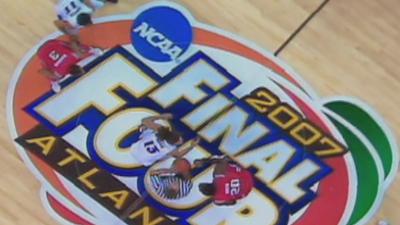Introduction
March 29, 2011

This March, the nation will once again go "mad," as more than 140 million people tune in to watch one of the biggest sporting events on earth -- the NCAA men's basketball tournament. But "March Madness" isn't just a basketball tournament. It's become big business, with television rights alone worth $10.8 billion over 14 years.
In Money and March Madness, FRONTLINE correspondent Lowell Bergman takes a hard look at the economics of the annual NCAA tournament -- a cash cow for amateur athletics that generates enormous dollars for everyone except the players themselves, raising basic questions of fairness that are now leading a handful of influential figures to challenge the way the NCAA operates.
Chief among the NCAA's critics is Sonny Vaccaro, a former executive at Nike, Adidas and Reebok who was a key figure in the commercialization of college and high school basketball in the 1980s and '90s. In his first in-depth interview since leaving the world of sports marketing, Vaccaro tells FRONTLINE he's had enough. After years of helping big corporations profit from amateur athletics, he now says he'd like to help the players get in on some of the profits. "Unless the people who make the rules and the people who divide the money up come to their senses, there's no recourse for the student-athlete," says Vaccaro. "Everybody has a right except the player. The player has no rights."
The question of paying players in big-time college sports has been raised for years, but now it's gaining new force, thanks to a class-action suit that Vaccaro and others helped initiate on behalf of former players. The suit challenges one of the pillars of college athletics, a contract that the NCAA forces all players to sign, which bars them from earning any money at any time from their college playing careers.
"The case is terribly important," says Andrew Zimbalist, an expert on sports economics. "It goes to the core principles of the NCAA's amateurism. ... If you look at it economically from afar, you say here's an organization that, in the name of amateurism, has imposed a plethora of restrictions, a large number of which seem to be consistent with trying to maximize the economic return that the schools get. ... In practice, the NCAA functions as a trade association for the athletic directors and the coaches and the conference commissioners."
"Who are these people making all this money?" former Final Four MVP and current Chicago Bulls star Joakim Noah asks Bergman. "And shouldn't the kids, once their college careers are over, shouldn't they get a piece of that? This is something that needs to be exposed."
But the new president of the NCAA, Mark Emmert, defends the amateurism of college basketball and rejects any form of payments to players. "I think that it would be utterly unacceptable to convert students into employees," Emmert tells Bergman. "The point of March Madness, of the men's basketball tournament, is the fact that it's being played by students. ... What amateurism really means is that these young men and women are students; they've come to our institutions to gain an education and to develop their skills as an athlete and to compete at the very highest level they're capable of. And for them, that's a very attractive proposition."
All eyes now are on the pending outcome of the class-action suit against the NCAA. "You've got to get a decision here," Vaccaro says. "It's amateurism or it isn't. Say yes or say no. If it's yes, then take care of the kids. If it's no, then the kids should be free to do what they want and shouldn't have to sign [away their rights on] scholarship papers."
Posted March 29, 2011
Watch Money and March Madness »
FRONTLINE series home | Privacy Policy | Journalistic Guidelines | PBS Privacy Policy | PBS Terms of Use
COMMENTS
blog comments powered by DisqusIn order to foster a civil and literate discussion that respects all participants, FRONTLINE has the following guidelines for commentary. By submitting comments here, you are consenting to these rules:
Readers' comments that include profanity, obscenity, personal attacks, harassment, or are defamatory, sexist, racist, violate a third party's right to privacy, or are otherwise inappropriate, will be removed. Entries that are unsigned or are "signed" by someone other than the actual author will be removed. We reserve the right to not post comments that are more than 400 words. We will take steps to block users who repeatedly violate our commenting rules, terms of use, or privacy policies. You are fully responsible for your comments.